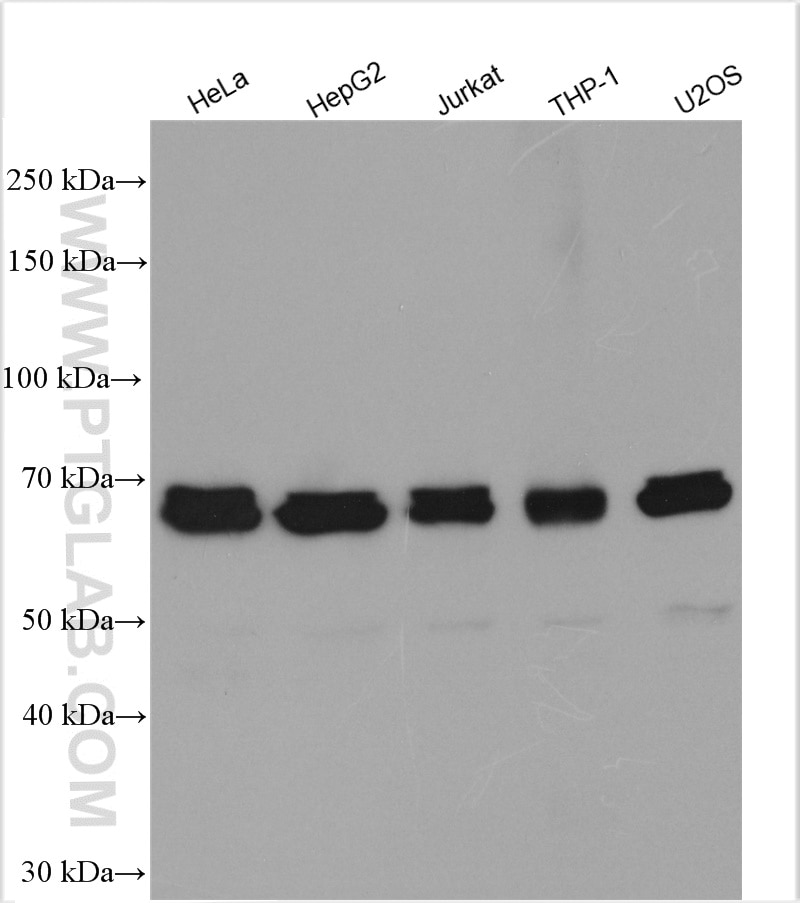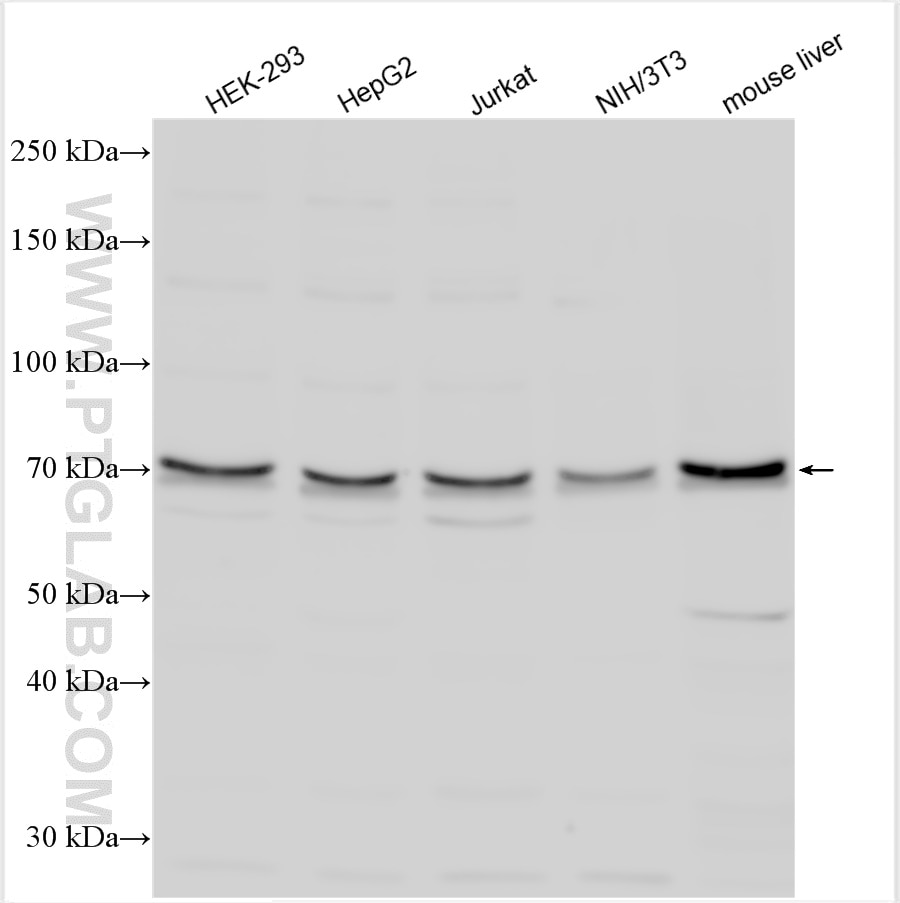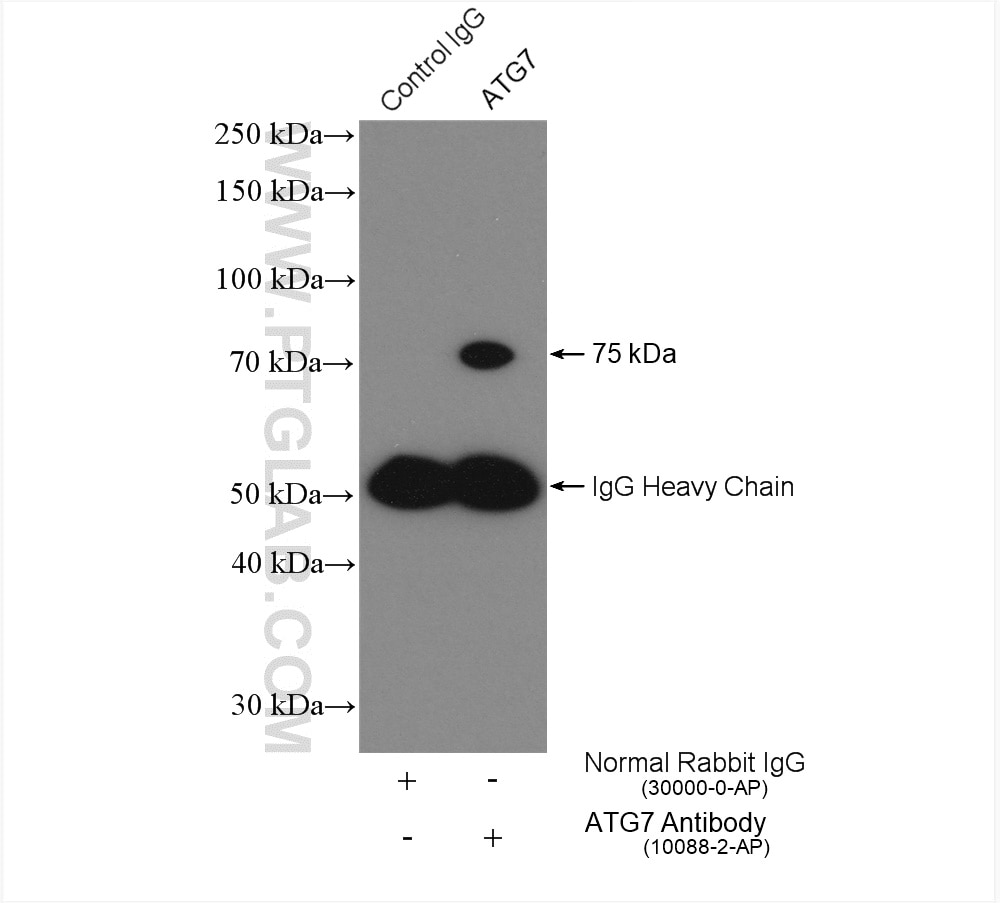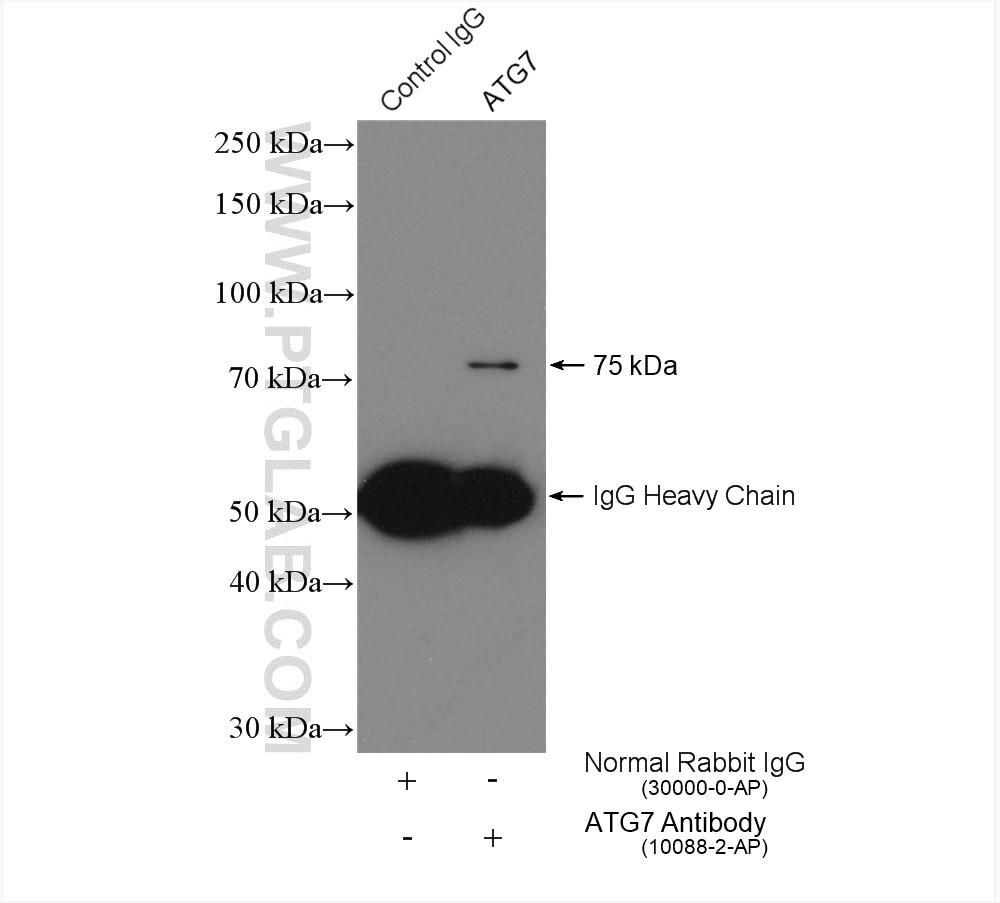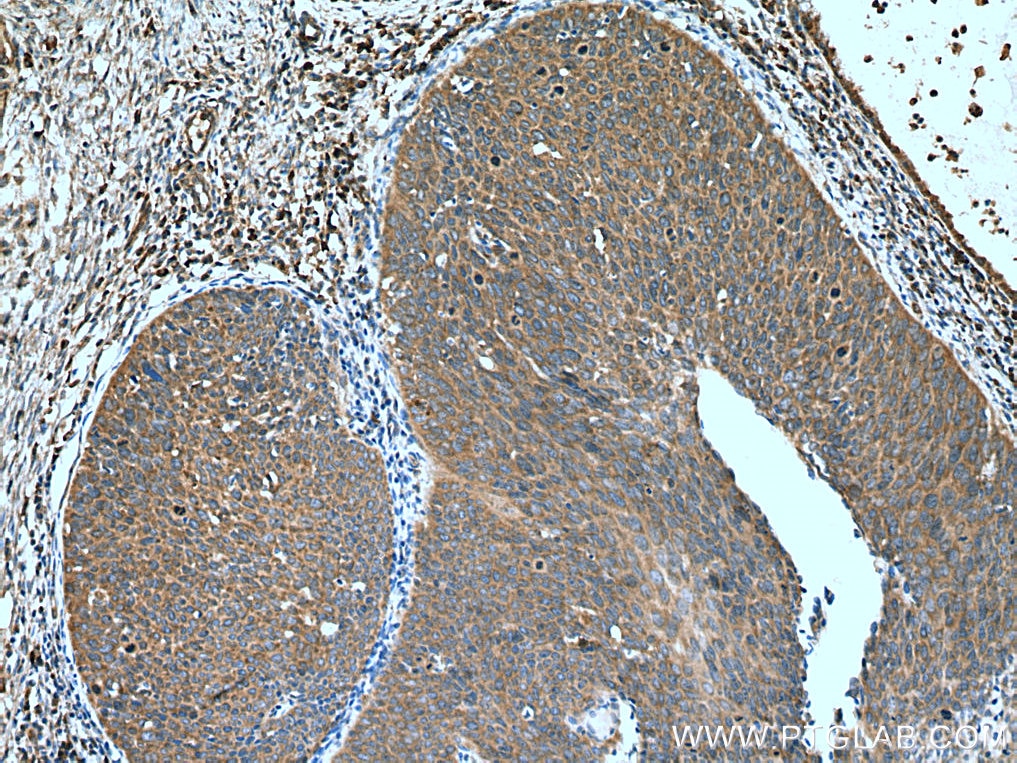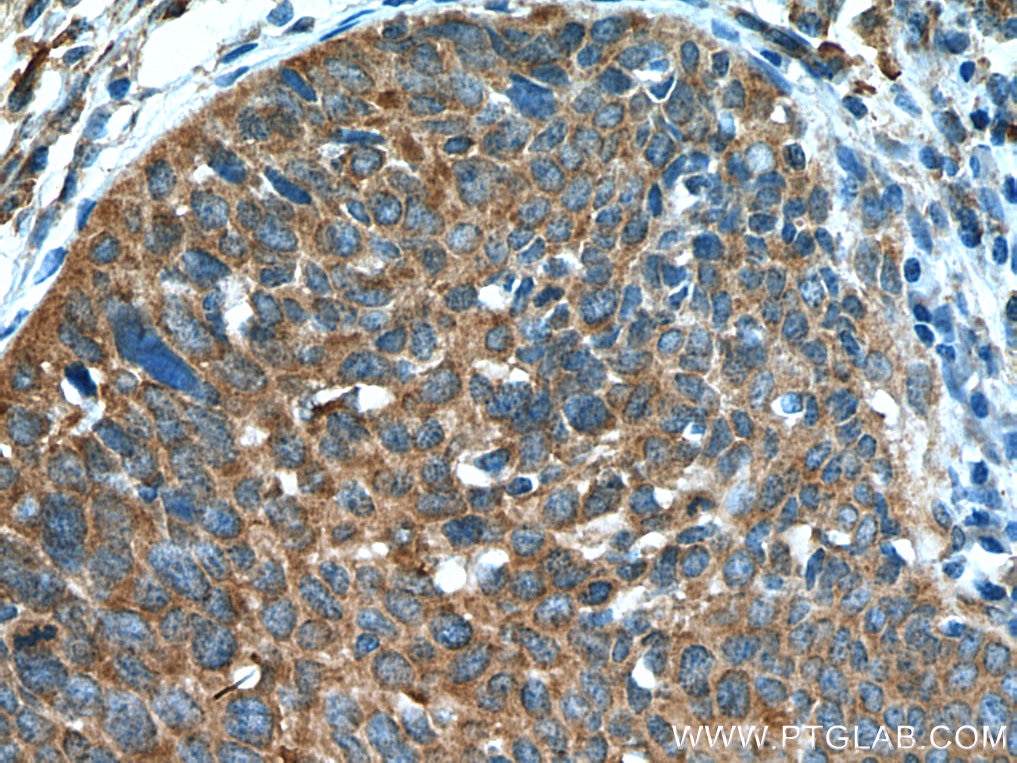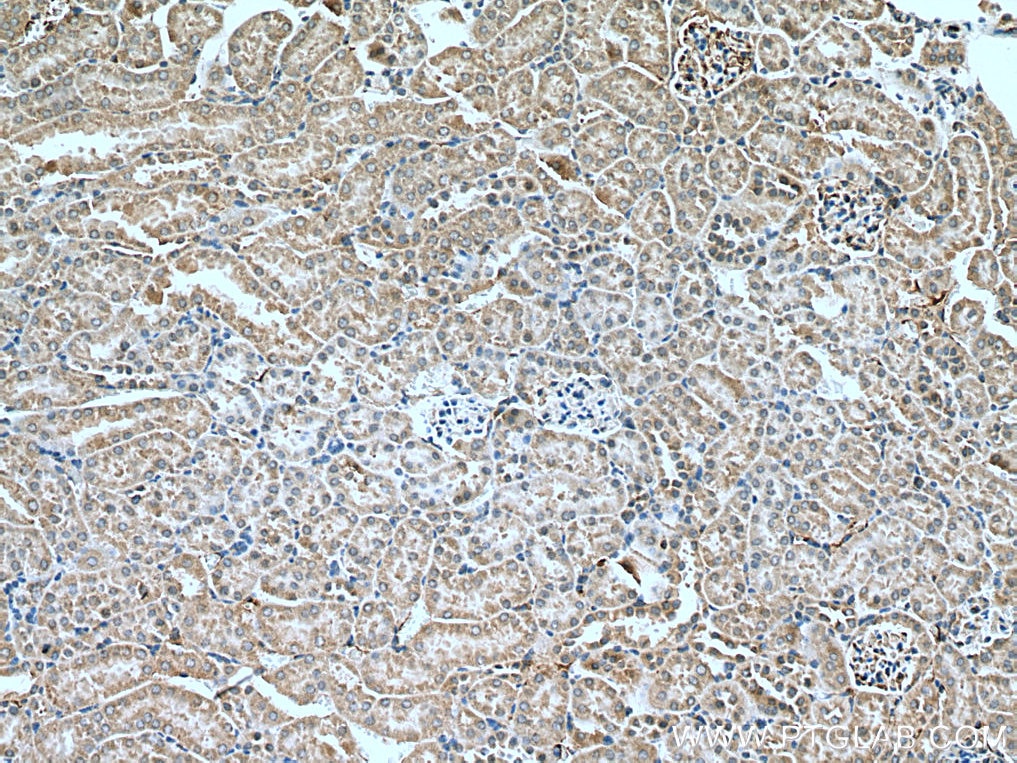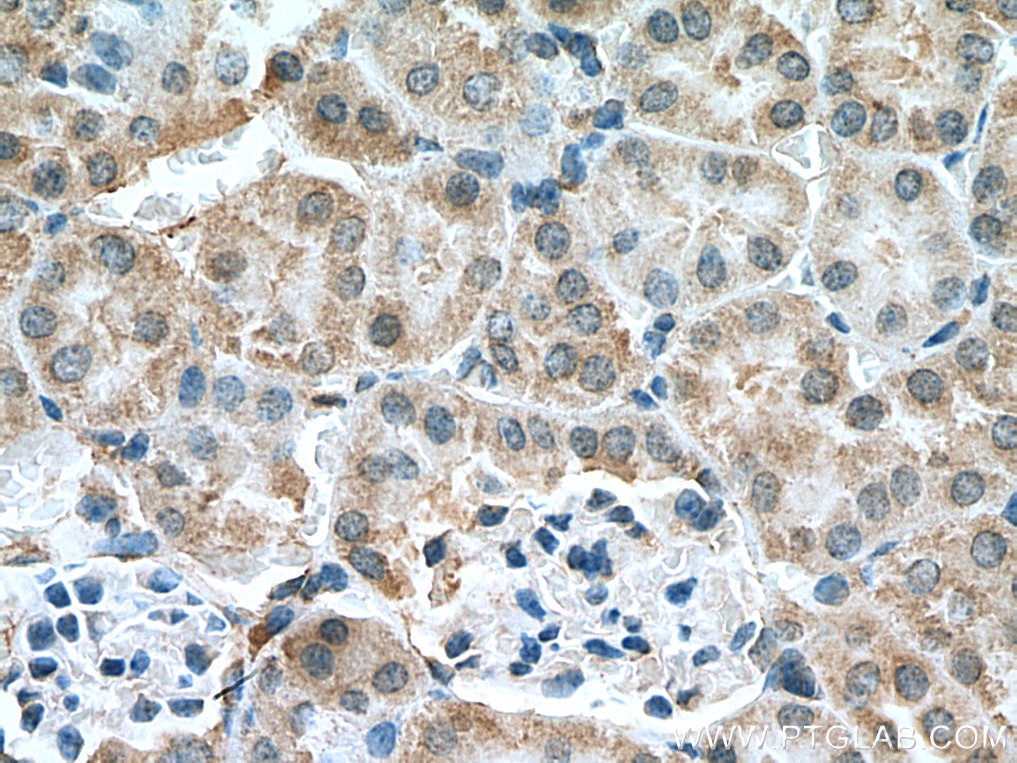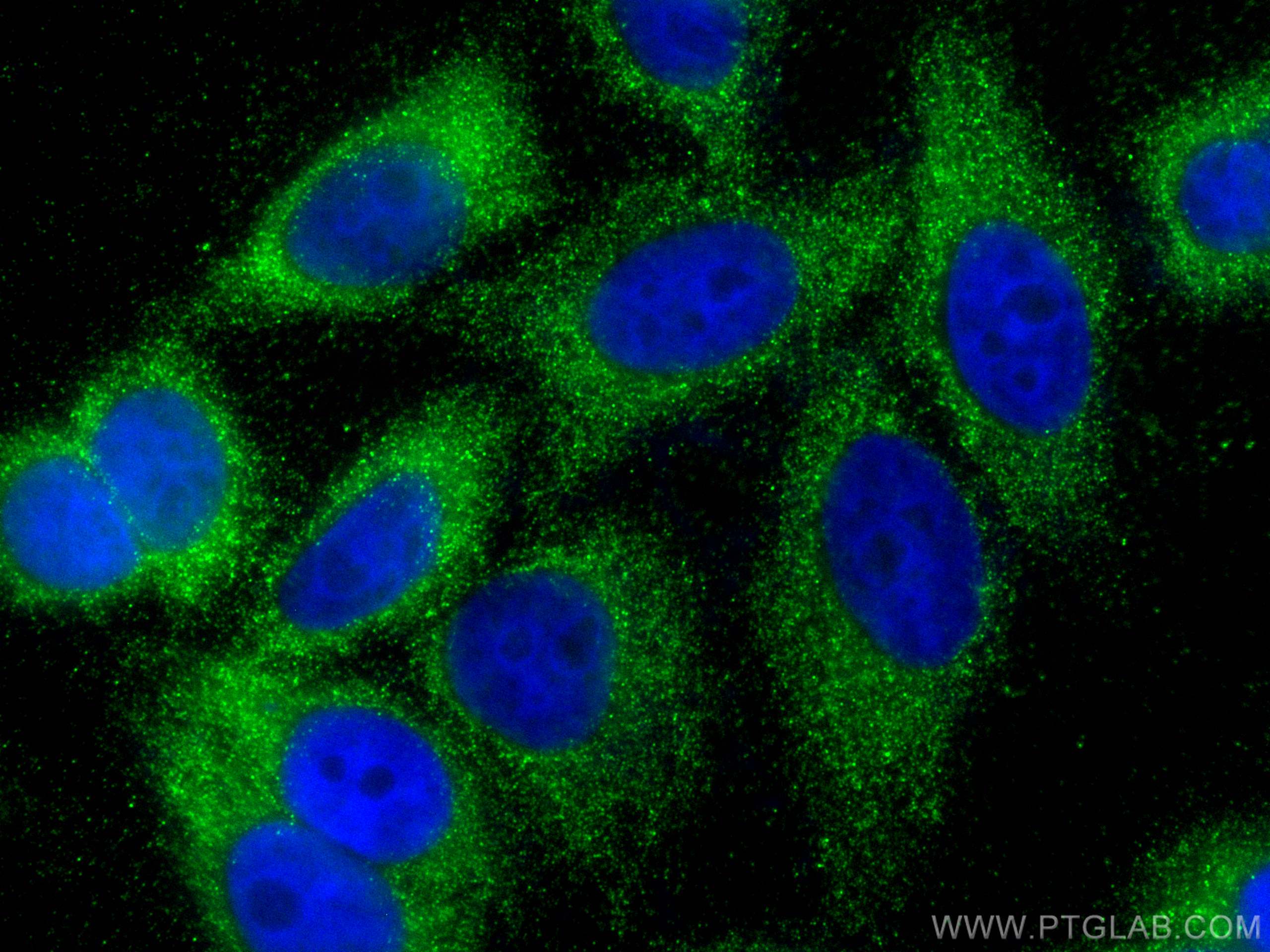- Featured Product
- KD/KO Validated
ATG7 Polyklonaler Antikörper
ATG7 Polyklonal Antikörper für WB, IHC, IF/ICC, IP, ELISA
Wirt / Isotyp
Kaninchen / IgG
Getestete Reaktivität
human, Maus und mehr (6)
Anwendung
WB, IHC, IF/ICC, IP, CoIP, ELISA
Konjugation
Unkonjugiert
Kat-Nr. : 10088-2-AP
Synonyme
Geprüfte Anwendungen
| Erfolgreiche Detektion in WB | HeLa-Zellen, HEK-293-Zellen, HepG2-Zellen, Jurkat-Zellen, Mauslebergewebe, NIH/3T3-Zellen, THP-1-Zellen, U2OS-Zellen |
| Erfolgreiche IP | HT-1080.Zellen, NIH/3T3-Zellen |
| Erfolgreiche Detektion in IHC | humanes Zervixkarzinomgewebe, Mausnierengewebe Hinweis: Antigendemaskierung mit TE-Puffer pH 9,0 empfohlen. (*) Wahlweise kann die Antigendemaskierung auch mit Citratpuffer pH 6,0 erfolgen. |
| Erfolgreiche Detektion in IF/ICC | HepG2-Zellen |
Empfohlene Verdünnung
| Anwendung | Verdünnung |
|---|---|
| Western Blot (WB) | WB : 1:500-1:3000 |
| Immunpräzipitation (IP) | IP : 0.5-4.0 ug for 1.0-3.0 mg of total protein lysate |
| Immunhistochemie (IHC) | IHC : 1:50-1:500 |
| Immunfluoreszenz (IF)/ICC | IF/ICC : 1:50-1:500 |
| It is recommended that this reagent should be titrated in each testing system to obtain optimal results. | |
| Sample-dependent, check data in validation data gallery | |
Veröffentlichte Anwendungen
| KD/KO | See 23 publications below |
| WB | See 141 publications below |
| IHC | See 17 publications below |
| IF | See 13 publications below |
| IP | See 1 publications below |
| CoIP | See 1 publications below |
Produktinformation
10088-2-AP bindet in WB, IHC, IF/ICC, IP, CoIP, ELISA ATG7 und zeigt Reaktivität mit human, Maus
| Getestete Reaktivität | human, Maus |
| In Publikationen genannte Reaktivität | human, hamster, Hausschwein, Huhn, Maus, Ratte, Ziege, Garnele |
| Wirt / Isotyp | Kaninchen / IgG |
| Klonalität | Polyklonal |
| Typ | Antikörper |
| Immunogen | ATG7 fusion protein Ag0142 |
| Vollständiger Name | ATG7 autophagy related 7 homolog (S. cerevisiae) |
| Berechnetes Molekulargewicht | 78 kDa |
| Beobachtetes Molekulargewicht | 68-78 kDa |
| GenBank-Zugangsnummer | BC000091 |
| Gene symbol | ATG7 |
| Gene ID (NCBI) | 10533 |
| Konjugation | Unkonjugiert |
| Form | Liquid |
| Reinigungsmethode | Antigen-Affinitätsreinigung |
| Lagerungspuffer | PBS with 0.02% sodium azide and 50% glycerol |
| Lagerungsbedingungen | Bei -20°C lagern. Nach dem Versand ein Jahr lang stabil Aliquotieren ist bei -20oC Lagerung nicht notwendig. 20ul Größen enthalten 0,1% BSA. |
Hintergrundinformationen
Atg7 is an E1-like enzyme that is specifically involved in autophagosome formation and is essential for autophagy. As an autophagic-related protein it is required for linking to Atg12, Atg5 and Atg8, which are essential for Atg conjugation and autophagosome formation. Atg7 has been reported as an important regulator of autophagy with starvation-induced or chemotherapeutic agent treatment. The high expression level of ATG7 is related to the survival of patients with breast cancer. There are several isoforms of ATG7 protein ranged from 68 kDa to 78 kDa.
Protokolle
| PRODUKTSPEZIFISCHE PROTOKOLLE | |
|---|---|
| WB protocol for ATG7 antibody 10088-2-AP | Protokoll herunterladen |
| IHC protocol for ATG7 antibody 10088-2-AP | Protokoll herunterladenl |
| IF protocol for ATG7 antibody 10088-2-AP | Protokoll herunterladen |
| IP protocol for ATG7 antibody 10088-2-AP | Protokoll herunterladen |
| STANDARD-PROTOKOLLE | |
|---|---|
| Klicken Sie hier, um unsere Standardprotokolle anzuzeigen |
Publikationen
| Species | Application | Title |
|---|---|---|
Adv Sci (Weinh) Inhibition of CK2/ING4 Pathway Facilitates Non-Small Cell Lung Cancer Immunotherapy | ||
Nat Commun Inhibition of the CDK2 and Cyclin A complex leads to autophagic degradation of CDK2 in cancer cells.
| ||
Autophagy Negative pressure wound therapy improves bone regeneration by promoting osteogenic differentiation via the AMPK-ULK1-autophagy axis. | ||
Autophagy AP2M1 mediates autophagy-induced CLDN2 (claudin 2) degradation through endocytosis and interaction with LC3 and reduces intestinal epithelial tight junction permeability.
|
Rezensionen
The reviews below have been submitted by verified Proteintech customers who received an incentive for providing their feedback.
FH Margaux (Verified Customer) (06-20-2025) | Used at 1/1000 in HeLa cells treated or not with siRNA targeting ATG7. I noticed non-specific band and couldn't see the downregulation of ATG7 protein expression in the siRNA condition.
|
FH Priya (Verified Customer) (10-03-2024) | Used this antibody for colon carcinoma cell line and mice tissue
|
FH Priya (Verified Customer) (08-09-2023) | Used for Caco2 cells and mice colon tissue
|
FH Kamal (Verified Customer) (06-29-2023) | Atg7 band showed up better than from other companies.
 |
FH Priya (Verified Customer) (06-21-2023) | Used this antibody for Caco2 cells and mice tissue
|
